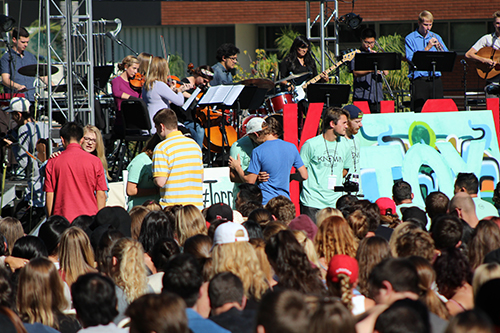The timeline for formulating Torrey Memorial Bible Conference begins long before the decision for the year’s theme. Due to the turnaround of student leaders involved, faculty often must quickly poll students and invite prestigious speakers to teach at least a year in advance.
The Planning Process
In the spring faculty interview and select student directors such as Jennifer Hahn, junior elementary education major. The directors plan major breakout sessions and invite speakers centering around the theme they choose after much prayer and preparation.
“As far as planning went, it was a long, tiring process, but definitely worth it in the end! There were a lot of moving pieces and changes this year, but we are thankful that everything is coming to completion within the week,” said Hahn in an email interview.
Lisa Igram, associate dean of spiritual development, offers insight on how faculty came to decide on student leaders after a rigorous and quick application process. In order to provide students with relevant and credible teaching, well-known international speakers must receive invitations approximately a year in advance, occasionally more.
“To get good speakers we have to schedule them at least a year out. So the team hasn’t been hired yet. So often Todd [Pickett] and several of us on a team will brainstorm ideas based on assessment and things that students from the prior year told us they wanted to know about,” Igram said. “We’ll usually book [good speakers], often before the team is hired — because of the timing of things.”
An enormous amount of work goes into planning breakout sessions and organizing one day full of spiritually-filling events for nearly 5,000 students, faculty and guests.
“Students come up with the title and the logo and they do videos and they help brainstorm topics for breakout sessions, and then if they know professors they want to speak at breakout sessions then they’ll invite them, or if we have contacts with people. So it can be, we still work with them, but all the decisions fall on them after a certain point,” Igram said.
The brevity of the conference also poses questions to the current state of its health — is the extreme shortening a sign of the slow death of Torrey? The shift could also take place to appease the student population’s preexisting inclination to complete all conference credit on one day, as well as due to budget cuts.
For the students
As well as becoming significantly shorter, the conference has also shifted in focus to be strictly aimed at the student body. For years, Biola has slowly changed its goal from educating those who cannot attain the level of learning desired from a Bible college to feeding its students and giving greater opportunities to hear from renowned speakers.
Fred Sanders, professor of history in the Torrey Honors Institute, elaborates on the slow change Biola has experienced over the years — from spreading out in the city to maintaining only the student body to slowly shrinking from a week and a half to one day.
“It used to be all over town. It happened in five or six churches throughout the city, because we were at Sixth and Hope back then. Five or six major churches would open their doors and host meetings,” Sanders said. “What I don’t know is when Biola’s Torrey Memorial Bible Conference changed from a sort of outward-looking ministry to the surrounding community to an inward-focused community.”
In addition, the problem remains where student workers may not be able to make all conference credits since a majority are on one day. Samantha Miller, senior public relations major, was hired to aid in planning Torrey conference and confirmed the conference staff offers student workers volunteering opportunities to aid in gaining credits prior to the conference starting.
“Students who volunteer at Torrey Conference are able to serve up to 4 hours to receive a maximum of 2 volunteer conference credits. Students who serve for 2 hours will receive 1 volunteer conference credit. Students are able to volunteer to help set up, clean up, scan or usher at the conference sessions,” Miller said in an email interview.
Hope amidst shame
Gisselle Trochez, senior marketing major, sat in chapel and received the news of this year’s Torrey conference theme: Released to be Known, Set Free to See. The conference revolves around the concept of shame, and how Christian individuals should face temptations of humiliation or guilt without losing hope in redemption.
“I think the theme will be really good because I think a lot of Biola students just struggle with shame and then pretend that everything’s fine on the outside, so I think it’ll kind of unearth a lot of deep stuff that’s going on within students, if they pay attention,” Trochez said. “I just think a lot of it comes from being at a Christian university and feeling like you have to have all your stuff together.”
Dean of spiritual formation Todd Pickett plays a key role in planning Torrey conference every year, from selecting student leaders to inviting renowned speakers to teach a year in advance. In his opinion, this year’s circumstances have not brought a slow death upon Torrey conference, but rather, good changes have come through student interest. He also finds the theme this year worth presenting to the Biola population as well as the greater Christian world.
“If we are loved but not known, we are concerned it’s not authentic. Of course, if we are known but not loved, we feel rejected. So being known is an important part of our relationship to God and our relationship to others. I would say, however, the greatest obstacle of being known and loved is shame,” Pickett said. “[Shame] was probably the first human emotion after the Fall.”







